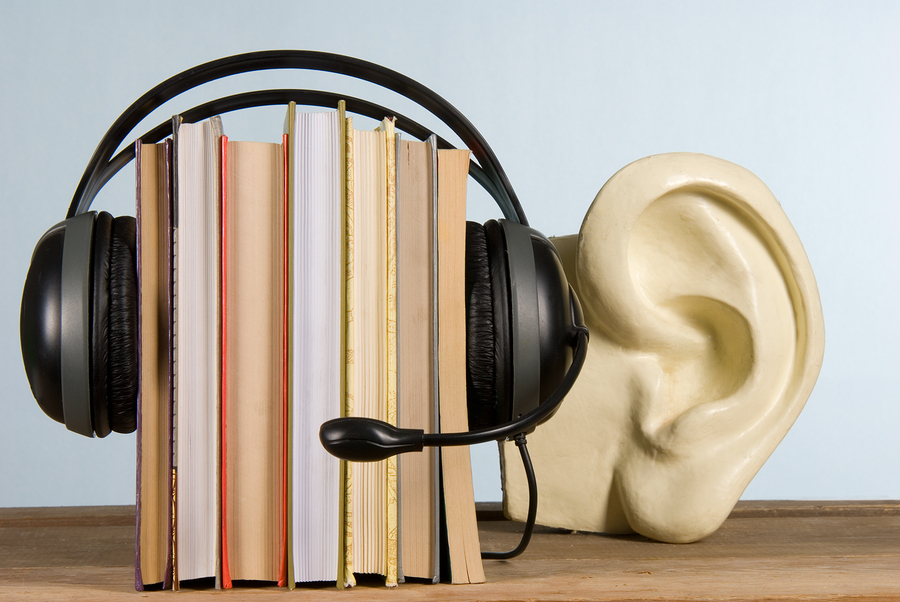Once you write something, try reading it out loud. It might change the way you write.
I worked with audiobooks for a number of years and few things were more interesting than how something sounded when read aloud by the audiobook performer, whether it was the author or a professional voice talent.
There were times, when an author read their own material for the recording, they actually stopped after reading a section and realized it made no sense, or at least was awkwardly constructed for the purpose of listening versus reading silently.
As I write these blogs, I will read it out loud after each draft, coming up with frequent edits making the text move quickly (at least it’s the plan!).
Many proofreaders will read out loud, finding it makes proofing more accurate.
When you read silently, more than likely you will skip words, like most readers, and miss those things which might create friction to understanding, or miss complicated combinations of words which slow down reading and comprehension.
Another element to this would be the issue of “voice” which if you don’t actually speak the words you write, might change. Often, a writer will speak in one voice and write in another, which is neither good or bad for fiction, but when writing non-fiction, if too much difference exists between your written and speaking voices, you will have trouble connecting easily in a public presentation of your work.
In addition, if your voice changes again in social media versus your written or spoken work, you will also confuse your audience. For instance, if you write with great depth of content and speak very articulately, using social media to tell funny stories or jokes or use words which could never be described as deep and articulate would cause a disconnect with your audience and break down your platform growth.
As an aside, regarding audiobooks, there is tremendous opportunity to expand your audience with a good audiobook. But I would caution any author not to read the audiobook yourself, instead, let a professional do it.
Unless you are quite unique in your abilities, you will do a less-than-stellar job narrating your own audiobook. It will take twice as long, cost more money, and more than likely be less listenable than if you had an experienced narrator do it.
Most authors do not do a good job reading their own audiobooks. It is a specialized talent done best by people who developed their ability to communicate verbally over many years of practice and performance.
Unless you are unique, don’t try this yourself at home.
Back to simply reading your writing aloud in the process of writing.
My suggestion is to do it only when you are in the latter stages of writing when you are attempting to smooth the flow, final self-editing, and preparing to show it to someone else for critique.
I suppose a major test could be to have someone else read it aloud to you, then you can actually hear what it sounds like.
It’s a simple technique to help you write a little better.
But you still have to know the proper use of colons and semicolons. Reading aloud doesn’t help at all with proper punctuation!



 A Request for a Full Manuscript! Now What?
A Request for a Full Manuscript! Now What?

Yes! Reading your work out loud is a mighty tool for editing and story. A most precious thing is to have others in the writing group read portions too. It puts a new perspective on how your words, your voice, sound: what sounds clear or muddy, where they stumble as they read, and where the not-so-glaring errors are.
I’ve bribed my kids to read aloud my writing, offering five minutes of screen time for every mistake they find. It helps me hear where they get tripped up with clunky writing, and they get nitpicky quick! 😀
This has helped me reconize ancillary are missing words, as well as errors I overlooked. I find reading aloud invaluable in editing!
Over time, my writing changed to sound more like me talking. And my talk changed to sound more like me writing. I’ve found my voice.
I find this so intriguing. I’m fascinated by “voice” and love hearing writers’ insights into their creative growth. Thanks for sharing.
I’ve done this many times, but have now decided to use this tool in the final read-through of my story before sending it off. It’s also a tool to relax after all the hard work of re-reading, self-editing, corrections from critiquers, re-re-reading, and then corrections from the editor. I can sit back and just listen to my story. Usually, I use a translating program to do the reading. It helps me pay more attention to the words since the voice is mechanical and sometimes gives a mispronunciation. LOL
Reading my writing aloud has long been a natural part of my process. I’ve been especially blessed and challenged by the opportunity for a monthly open-mic night for writers at a local bookstore.
Our fledgling Central Kansas Christian Writers Critique Group uses the Word Weavers method of critique. We bring multiple copies of our work, and the person sitting to the writer’s left reads the passage brought for critique. Everyone else listens with pen in hand, making notes.
Hearing the passage read aloud by someone other than the writer is of inestimable value in finding places to improve. If you cannot find someone to read your manuscript aloud, you can always read it yourself, recording as you go, so that you can play it back.
Hearing your manuscript should be an essential step before submission. Thank you for bringing this to our attention, Dan. We all need the reminder.
After reading my manuscript silently about two dozen times I thought it was ready to submit, but I discovered the voice reader in Microsoft Word and thought I’d give it a try. I was amazed at how often I had to stop and rewrite sentences, correct spelling, complete a thought, etc. Now my husband sits with me and listens. I can’t tell you how many times he’s stopped the reading and asked questions. It’s definitely beneficial to have extra ears listening and someone else reading.
Great post, Dan!
I think an exception to the “don’t read your own audiobook” is to be found in Kate Bowler’s “Everything Happens For A Reason And Other Lies I’ve Loved”.
She’s a religious-studies academic at Duke who, at the beginning of her career, found herself suddenly diagnosed with stage IV cancer. The book is her journey of despair and faith. It needs her voice; you need to hear her heart.
You can listen to an excerpt on Amazon; be prepared to weep. I did.
https://www.amazon.com/gp/product/0399592067?ie=UTF8&tag=atthecrossroa-20&camp=1789&linkCode=xm2&creativeASIN=0399592067
I used to do this with my college papers all the time and I still do it with my current writing! It definitely helps a lot!
Great advice. Thank you for sharing this.
Great advice, Dan! In addition to its benefits for critiquing and polishing somewhat finished pages or chapters, I’ve found that reading aloud is also a great help in improving individual sentences. I recommend it for any sentence that contains multiple clauses or a lot of modifying phrases. Sometimes a really long sentence that made perfect sense to my client writer (or to me when I’m the writer) does not makes sense at all when read aloud, no matter how I try to phrase it vocally. That sentence needs to be broken down into two or three shorter, clearer ones. After all, the goal is to communicate!
This is great advice.
I have always read my writing aloud. Since I speak as much as I write, and often on the same topics, I really want my voice to be consistent, like you said. If I couldn’t say it to my audience while speaking, it won’t work in my written submissions. Reading out loud often highlights those things that might be proper sentences, but aren’t something I would actually say in a conversation or teaching. Then I know I have to rewrite. I want people to hear me speaking to them when they read my work.
This method was also very useful when I was ghost writing a book for someone whose first language was not English. It helped her to hear it, so in the process of writing the book her English really improved. (Although she still stopped numerous times during her book release speech to ask me if her sentences were correct.)
Thank you, Dan!
Reading my work out loud after late-late-night writing sprees has really helped me catch double words and misspellings. Such a reminder that what we “hear” in our heads often does not come out that way…
Hi Dan,
I agree with you and all the comments. I read before I post for a critique, then make changes accordingly. I also use a program that reads every word out loud (because it is a robot) and catches doubling up, awkward wording, and catches my spelling and ‘way too long’ sentences (<– like this one).
Then I have another critique-r read through and since she's a grammar-aholic she screens even more.
-C
Dan, thanks for confirming the advice I give my writing students. Though they are taking business and technical writing, rather than creative writing, it is still great advice. I read my entire dissertation out loud.
I actually wrote a blog posting last Friday called “I dont knead to prove reed cause my writings prefect.”
I tend to “hear” what I’m silently reading, which may be due to my background in music. In the music field, one gets used to seeing and listening simultaneously, whether the music is audible or not. In my writing, I often check for flow by silently listening.
I wonder if any other writers with a music background have experienced this.
Absolutely! I hadn’t thought of it that way, but you’re right–that’s exactly what I do, too. Background in piano, organ, violin and voice. Thanks for the fresh perception!?
You are most welcome! How fun to find a compatriot. We overlap in three instruments, by the way—piano, voice, and violin. Hmmm, perhaps there is something to glean from a comparison of voice in singing and voice in writing . . .
Great post! And I totally agree. Though sometimes, it’s hard to get time alone enough to read aloud–or reading aloud after being sick induces a major coughing fit. Also, some people are simply shy. Another tool I’ve used is voice-to-text. Granted, it’s not as good as it could be, but I’ve found that it does slow my eye down during proofing, and there have definitely been a time when flow issues have popped up.
Regardless of method, I’ve come to see it as a vital part of polishing a novel.
If you are prone to typos, read your writing aloud like a robot, meaning choppy and mechanical sounding. Like me, you’ll see that what is actually written is different from what you’ve been reading in a normal voice. I do this with my middle school students, and every time, they find simple typos.
It makes such a difference and it is easier to see how the story flows.
I am a speaker first, and often write how I speak which means I have the opposite problem where my writing often has many technical errors due to being too conversational. Yet, I do think reading our work out loud is a great way to test consistency and clarity. Having someone read my work out loud to me…oh my! That might be the next step for me, but certainly an intimidating one.